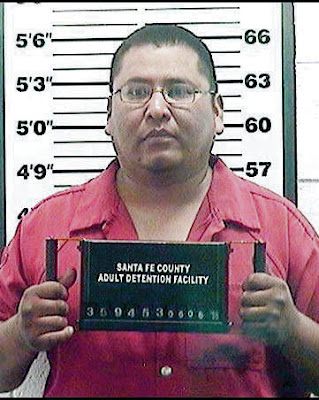Federal prosecutors want the death penalty for Kirby Cleveland, a Navajo man accused of killing a tribal police officer last year.
The case could signal that U.S. Attorney General Jeff Sessions will take a more aggressive approach with the death penalty in Indian Country, though most tribes, including the Navajo Nation, are opposed to capital punishment. Regardless of how it plays out, Cleveland's case is likely to revive a debate on race, sovereignty and just who can deliver justice on reservations across New Mexico - and the country.
New Mexico abolished capital punishment in 2009, but the federal government still has a death penalty and jurisdiction over certain crimes on tribal land.
Congress gave tribes a choice in the 1990s on whether to opt out of the federal death penalty, and most did.
The Navajo Nation, the largest tribe in New Mexico, officially has opposed the death penalty in the past.
And in a letter about Cleveland's case last year, the tribe's attorney general told the U.S. attorney for New Mexico that while the killing of Officer Houston Largo during a traffic stop in March 2017 was a tragic loss, the Navajo Nation's position remained the same.
"The death penalty is counter to the cultural beliefs and traditions of the Navajo People who value life and place a great emphasis on the restoration of harmony through restoration and individual attention," Attorney General Ethel Branch wrote, citing past testimony to Congress.
But President Donald Trump and Sessions, his attorney general, have been vocal supporters of the death penalty.
Even before taking office, Trump was known for having issued public pleas for death sentences in prominent cases.
The Wall Street Journal reported in January that the Trump administration expects to approve more death penalty cases than his predecessors, citing a senior U.S. Justice Department official who said Sessions views capital punishment as a "valuable tool in the tool belt."
In a statement, the U.S. Attorney's Office for the District of New Mexico said the decision to seek the death penalty in federal cases must be "based upon the facts and law applicable to each case."
"Although the Navajo Nation has stated its general opposition to the death penalty and the Justice Department has great respect for the Navajo Nation's traditions and position on this issue, the Tribe's position is not binding on federal prosecution and the Justice Department must still pursue the consistent and even-handed national application of the federal death penalty," a spokeswoman said.
The case also comes following recent calls on the Navajo Nation for tribal leaders to embrace capital punishment.
The mother of Ashlynne Mike, the 11-year-old girl kidnapped and murdered near Shiprock in 2016, started a petition urging the Navajo Nation government to opt in to the federal death penalty and allow capital punishment in the case of her daughter's killer - who ultimately got a life sentence.
Navajo Nation President Russell Begaye told The New Mexican last month that he supports capital punishment for the killing of a police officer on duty.
"Police officers are out there doing jobs they are trained to do in order to deal with threats and protect the public," he said in a statement. "A person like Kirby Cleveland has no respect for the uniform, or for the people who wear it. He should face the death penalty."
The president's office did not respond to follow-up questions about whether he supports a broader change in the Navajo Nation's policy on capital punishment.
Death sentences for Native Americans are exceedingly rare in federal court.
Lezmond Mitchell, a Navajo man convicted of carjacking and murdering a 63-year-old tribal woman and her 9-year-old granddaughter in 2001 as part of the robbery of an Arizona trading post, is the only Native American on the federal death row.
Despite opposition from the victims' family and the Navajo tribal government, federal prosecutors sought a death sentence in Mitchell's case. They argued that tribal authorization was not necessary because the case involved a crime - carjacking resulting in death - that would have given the federal government jurisdiction regardless of whether it occurred on the reservation.
Critics contend that reasoning created a sort of loophole to impose the death penalty, despite tribal opposition.
Unclear is how often federal prosecutors might use that provision to pursue death sentences in cases from Indian Country.
Under the last Republican president, George W. Bush, the Department of Justice was known for pushing the death penalty, overruling in some cases prosecutors who had recommended different sentences.
Still, the federal government has a somewhat elaborate process for determining whether to seek the death penalty in particular cases, with prosecutors consulting victims' families and, when applicable, tribal officials.
And Robert Dunham, director of the Death Penalty Information Center, cautions that whatever the president or his attorney general might say, it may be too early to tell whether the Trump administration's tone on capital punishment will lead to more death sentences in Indian Country.
Cleveland's case is extraordinary in that he is accused of killing a law enforcement officer, he noted.
"I don't think this tells us whether there is a difference in the way they are pursuing the death penalty on Native lands," he said of the Trump administration. "We have to have more experience with what actually happens. It's hard to tell whether what we???re seeing is an increase in actual usage."
After all, President Barack Obama had called the death penalty "deeply troubling," but under his administration, the federal government still won death sentences in cases against one of the Boston Marathon bombers and a young man who killed nine worshippers in a South Carolina church. The Obama administration also sought the death penalty in less high-profile cases, such as the murder of a postal worker and the killing of a federal prison inmate by his cellmate, who prosecutors say has threatened to kill any other cellmates until he is sentenced to death.
But Kevin Washburn, the former head of the Bureau of Indian Affairs, a professor at The University of New Mexico School of Law and a member of the Chickasaw Nation, noted that the death penalty is particularly complicated in Indian Country.
At the state level, the death penalty has been applied disproportionately toward people of color, he said.
And cases against Native Americans in the federal system often play out far from reservations, rather than in front of a jury of peers, he noted. That means a murder committed in Nageezi or Shiprock might actually be tried in front of a jury in Albuquerque.
Source: santafenewmexican.com, Andrew Oxford, March, 2018
⚑ | Report an error, an omission, a typo; suggest a story or a new angle to an existing story; submit a piece, a comment; recommend a resource; contact the webmaster, contact us:
deathpenaltynews@gmail.com.
Opposed to Capital Punishment? Help us keep this blog up and running! DONATE!
"One is absolutely sickened, not by the crimes that the wicked have committed,
but by the punishments that the good have inflicted." -- Oscar Wilde












